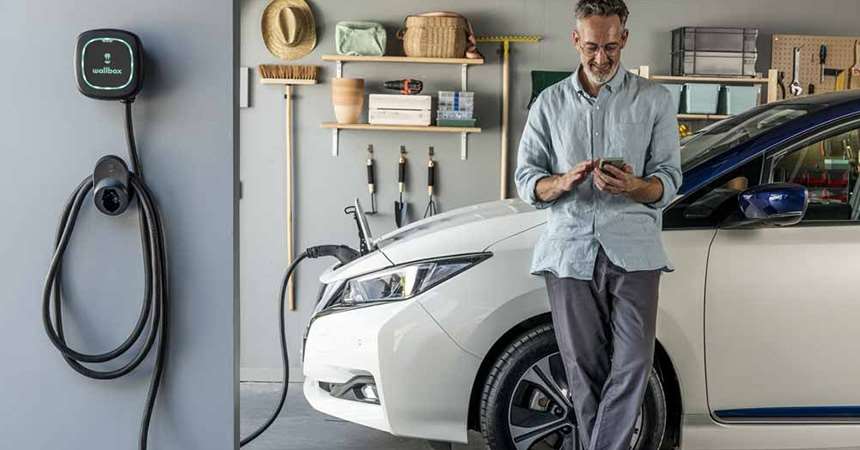How Many Solar Panels are Needed To Charge Your EV (Electric Vehicle) At Home?

How Many Solar Panels are Needed To Charge Your EV (Electric Vehicle) At Home?
Viridis EnergyHow Many Solar Panels are Needed To Charge Your EV (Electric Vehicle) At Home?
Electric vehicles (EVs) have become increasingly popular, with almost every major manufacturer now offering an EV model, and sales of EVs almost doubling in 2022. Not only do they help you save on fuel costs, but they also significantly reduce carbon emissions. However, to maximize the benefits of switching to an EV, it's essential to consider how you'll power it. EVs powered by solar energy have the added advantage of running on clean, renewable energy. But how many solar panels are needed to power your EV over the long haul?
Charging at Home vs. Public Charging
Presently, there are two basic options to charge an EV – either at home or at a public/commercial charging station. About 80% of EV drivers today charge their vehicles at home. While EVs help reduce fuel needs, charging them increases demand on the electrical grid, which means that the energy source powering your home's electricity grid will ultimately determine how much cleaner your EV energy is. Having a rooftop solar system helps you run your EV entirely on clean energy, reducing your carbon footprint.
Moreover, having an EV charger at home is much more convenient, as charging your vehicle overnight is much easier than spending part of your day hunting down a public charging station.
How much Energy is Required to Fully Charge your EV?
On average, people drive approximately 14,000 miles per year, and the average EV can go about 3 miles per kilowatt-hour. So, to power your car for an entire year, you'll need about 4,666 kWh of additional energy (14,000/3 = 4,666).
How Many Solar Panels are Needed to Meet this Additional Demand?
Typically, every kW of solar installed on your roof produces roughly 4 kWh/day, or about 1,500 kWh/year. Depending on weather conditions, location, and seasons, this energy production may vary. Therefore, to produce 4,666 kWh of energy, you'd need an additional 3.1 kW system, which translates to 8-12 panels, depending on their power output, to run an average EV entirely on solar energy.
Do you Need to Add More Solar Panels to your Home if you Already Have a Solar System?
This decision depends on various factors, such as whether your current solar system is covering all of your electrical use. Suppose your solar system is not meeting all your energy requirements. In that case, it may be worth it to add a 3 kW or more on your rooftop to meet the increased energy consumption due to EV use. Alternatively, suppose your solar system is already covering your energy needs or even overproducing. In that case, you could add a home battery to use some of your solar energy to charge your EV at night. SunPower's SunVault Storage System, for instance, can be programmed to kick in during times of demand (like when your EV is charging) to serve your loads from stored solar energy rather than the grid.
If you want to be able to rely on energy storage for power outages, adding some additional solar panels to your solar system may be the solution. SunPower's highly efficient solar panels can put a lot of power on your roof, even with a limited amount of space.
Should You Go Solar First If You're Buying an EV and Don't Have Solar Yet?
If you're considering purchasing an electric vehicle and you don't have a solar system yet, it's worth considering going solar first. Adopting a clean energy approach for your home can help keep your electricity costs under control, especially if you plan to charge your EV at home. SunPower Equinox solar system is an efficient and streamlined solution that can determine the optimal number of solar panels to meet your energy needs.
Additionally, A SunPower premier dealer and installer like Viridis Energy Solutions can guide you through the entire process. Keep in mind that you can also add a SunVault storage system in the future as your needs change. Transportation is considered the final frontier in decarbonizing the environment. Choosing solar energy to power your EV can help you contribute to this challenge while saving on electricity costs.
Viridis Energy Installs Home Solar Systems With EV Chargers
Viridis Energy is an award winning residential and commercial solar provider based out of Boston, MA. We are the leading SunPower dealer and installer in Massachusetts. Reach out to Viridis Energy to set up your no cost analysis with a professional solar consultant today if you are interested in learning more about Solar and Home EV Chargers.
Get started by filling out the form below and calculating your savings!
SEE HOW MUCH YOU CAN SAVE BY GOING SOLAR
CALCULATE YOUR SAVINGS
